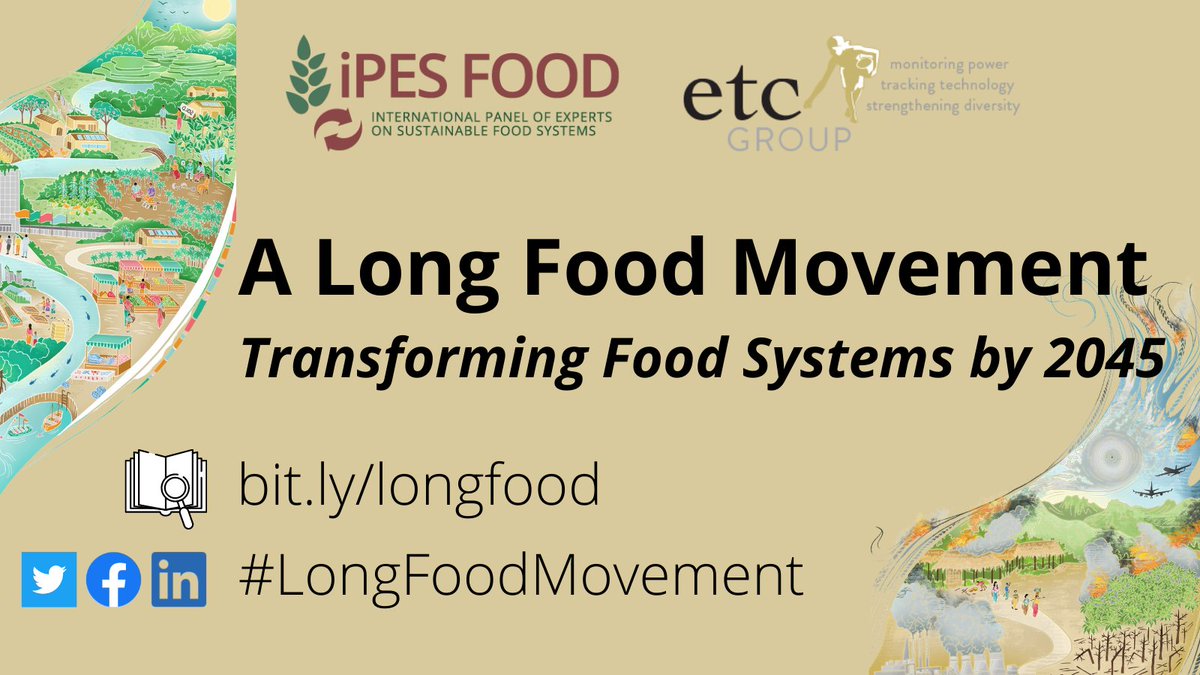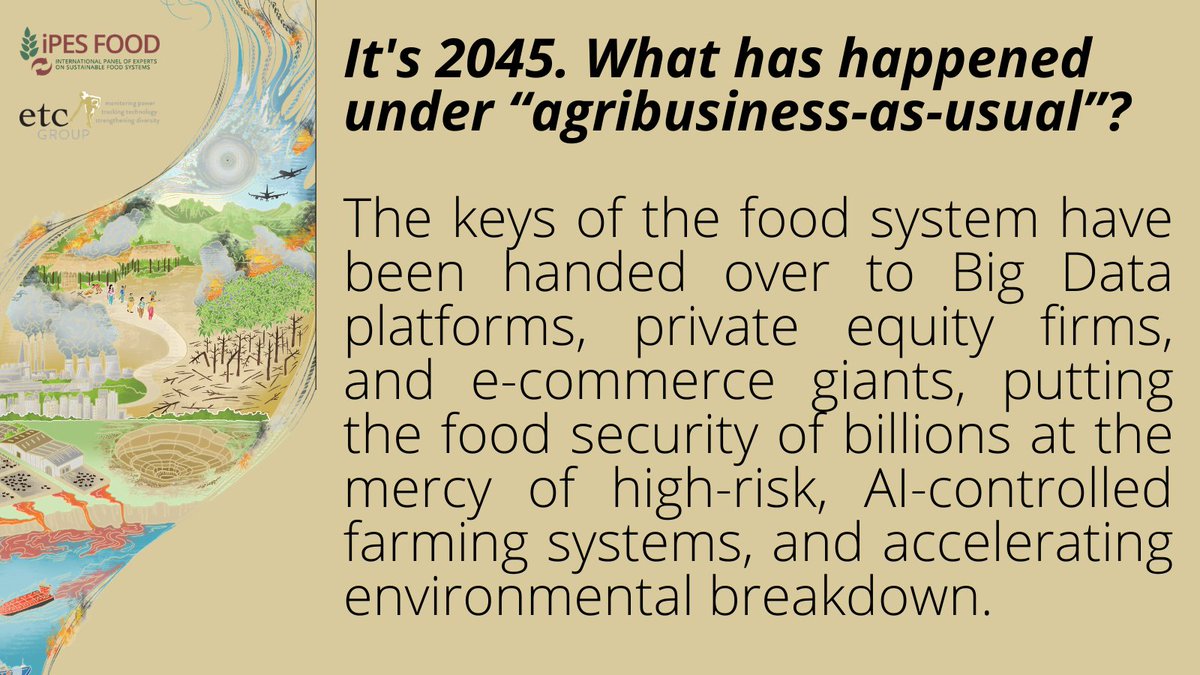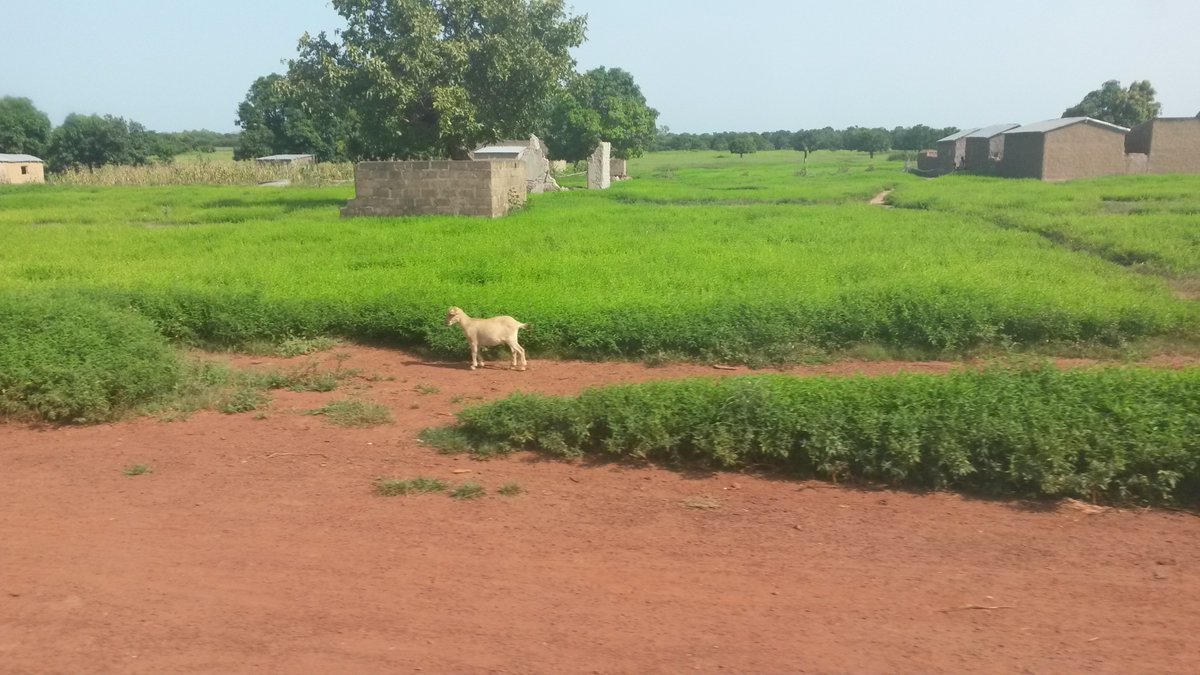
💡 How the resetting of corporate control of food systems is already well under way 👇🏾
📰 frontiersin.org/articles/10.33…
🧵 A thread on #foodsystems & the #UNFSS /1
📰 frontiersin.org/articles/10.33…
🧵 A thread on #foodsystems & the #UNFSS /1

Few people will dispute that global food systems need transformation, but this #UNFSS is instead an effort by a powerful alliance of multinational corporations, philanthropies, and export-oriented countries to subvert multilateral institutions of food #governance.
/2
/2

Once Guterres appointed a Special Envoy and the structure of the Summit was announced, the drivers behind the Summit became clear.
🔎 frontiersin.org/articles/10.33…
/3
🔎 frontiersin.org/articles/10.33…
/3

Global food systems do need transformation. The Lancet Commission on the Double Burden of Malnutrition describes the current state of food & agricultural systems as a “triple crisis” in which #obesity, #undernutrition, & #climatechange are decimating human & planetary health. /4
Despite global commitments to end #hunger by 2030 in #SDG2, the no. of people who are food-insecure has risen since 2014. According to the most recent State of #FoodSecurity & Nutrition in the World report, 746 million people were suffering from severe food insecurity in 2019. /5
The #COVID19 pandemic has further exacerbated hunger and is anticipated to add between 83 and 132 million more people to the number in chronic undernourishment. /6
#Malnutrition, including both micronutrient deficiencies or so-called “hidden hunger” as well as overweight and obesity now plague ~3.4 billion people worldwide (@hlpe_cfs, 2020). /7
Now, while colonialism laid foundations for globalization of food systems since formation of @FAO, shifting ensemble of individuals, states, & social movements sought to build institutions with public regulatory capacity to promote global food security & human right to food. /8
However, this vision of what we call “public global food governance”—that is, a system of multilateral coordination and regulation premised on democratic deliberation—has been routinely undermined by powerful actors ❗️ /9
These actors instead promote international finance institutions, global regulatory fragmentation, & public-private partnerships that push industrial ag, productivism & trade liberalization at the expense of food security & livelihoods of small-scale producers & rural workers. /10
💡 It is this set of industrialized agricultural practices—with their high levels of synthetic inputs and proprietary technologies—that have been most responsible for the triple crisis that we are now experiencing.
🔎 frontiersin.org/articles/10.33…
/11
🔎 frontiersin.org/articles/10.33…
/11
"Increased partnering of “public” w/ “private” interests over time has shifted balance of power to private sector. #UNFSS exemplifies this shift. By privileging private initiative under @WEF auspices, it overturns principle of multilateralism to enable corporate capture." /12 

After years of propounding narrative of the necessity of proprietary techs to feed the world, it is clear that industrial food system has left communities more vulnerable to climate change as result of decreased #biodiversity & degraded #soil health. /13
Multinational corporations, agro-exporting states, and the @GatesFoundation have therefore sought to recapture control of governance through the framework of “climate-smart agriculture” (CSA). /14
1st articulated @FAO in 2009, CSA is conceptualized as approach to ag development & #governance within “market liberal frame” - emphasizes “pricing, market-making, technology & protecting private property rights to meet twin challenges of climate change & food insecurity” /15
In turn, opposition to this agenda by @via_campesina & the @CSM4CFS have also led the @FAO and @UN_CFS to increasingly recognize the concept of #agroecology 🌱 In 2014 & 2018, the FAO organized two International Symposia on agroecology. /16
In the CFS, the High-Level Panel of Experts (@hlpe_cfs) published a report on Agroecological and Other Innovations For #Sustainable Food Systems (2019), promoting #agroecology as a transformational pathway for sustainable food systems. /17
This interest in agroecology stems not only from advocacy by civil society, but also the widening global consensus of the failures of the industrial food system. /18 

Now, the designation of the #UNFSS as a food systems summit is significant. The concept of #foodsystems was developed as a holistic, systems-based approach to account for all the ecological and social activities through which food is produced, distributed, and consumed ... /19
❗️ As the language of “sustainable food systems” has grown more widespread, however, it has been watered down. /20
As @DeSchutterO & Olivia Yambi wrote with regard to the #UNFSS, the focus on food systems is welcome; but “talking about food systems is not enough. *How* we talk about them and *with whom* is what matters most” foodtank.com/news/2020/03/2…
/21
/21
Now, back to the Summit...
❗️ Despite two different letters with support from over 500 organizations demanding a termination of the @UN/@WEF agreement and the appointment of the President of #AGRA as Special Envoy, the UN Secretary-General failed to respond.
/22
❗️ Despite two different letters with support from over 500 organizations demanding a termination of the @UN/@WEF agreement and the appointment of the President of #AGRA as Special Envoy, the UN Secretary-General failed to respond.
/22

[The letter of March 2020 explained that civil society concerns were rooted in expansion of corporate influence on food systems & AGRA's approach to agricultural investment. This roll-out of the Summit seemed to capitulate to US critiques of @FAO for promoting #agroecology. /23 ]
The Special Envoy has described #UNFSS as a “People's Summit,” but there is no recognition of the need to center voices of front-line food system actors whose rights have been consistently violated and who are not being well-served by #foodsystems. /24
🔎 frontiersin.org/articles/10.33…
🔎 frontiersin.org/articles/10.33…
The UNFSS launch & subsequent development have been non-transparent & chaotic, even according to supporters. This is apparent in selection & recruitment of participants & leaders of diff. components & a confusing structure, w/ proliferation of tracks, sub-tracks & committees. /25 

The degree of confusion generated by well-seasoned bureaucrats who seem to be in charge has led some people to speculate that the convoluted structure is intentional to allow takeover by corporate participants, or at least frustrate social movements' attempts to stop this. /26
What was perhaps most surprising about the Summit is its elaborate structure, which replicates already existing bodies in the CFS and reconstitutes them as experts and advisors hand-picked by the Special Envoy. /27
Despite elaborate design of Dialogues (inc. 44-page “reference manual” on how to facilitate), there's no indication on #UNFSS website about how vast amount of input they will generate be filtered & compiled nor how it will influence activities of the Summit or its outcomes. /28 

These problems stem from the fact that inclusivity in the #UNFSS is primarily interpreted through the paradigm of #multistakeholderism, a form of #governance that has been imported from the corporate sector into the public domain. /29 

For the @WEF, multistakeholderism is a strategic approach to maintaining liberal trade agreements and open markets, while reducing risks from environmental degradation and popular resistance. /30
By appointing the current President of AGRA as Special Envoy, the UN not only signaled support for AGRA's market-led, technology-driven approach, it invited the rescaling of a corporate-philanthropic alliance developed on the African continent onto the global scale. /31
The Civil Society and Indigenous Peoples Mechanism of the CFS (@CSM4CFS) , La Vía Campesina (@via_campesina), and movements aligned with the International Planning Committee for Food Sovereignty are well-justified in their concerns about the #UNFSS. /32 

💡 The authors of this paper argue that the time and money spent on the #UNFSS would be better spent on shoring up the @UN_CFS & analyzing and addressing conflicts of interest that have derailed some important negotiations there; ... /33
🔎 The paper argues to strengthen voices & solutions from below such as food #sovereignty; & democratize public institutions related to food systems, so they serve everyone.
✅ "strengthening the vision of public global food governance that is necessary to #EndHunger"
-ENDS-
✅ "strengthening the vision of public global food governance that is necessary to #EndHunger"
-ENDS-
@threadreaderapp unroll.
• • •
Missing some Tweet in this thread? You can try to
force a refresh









